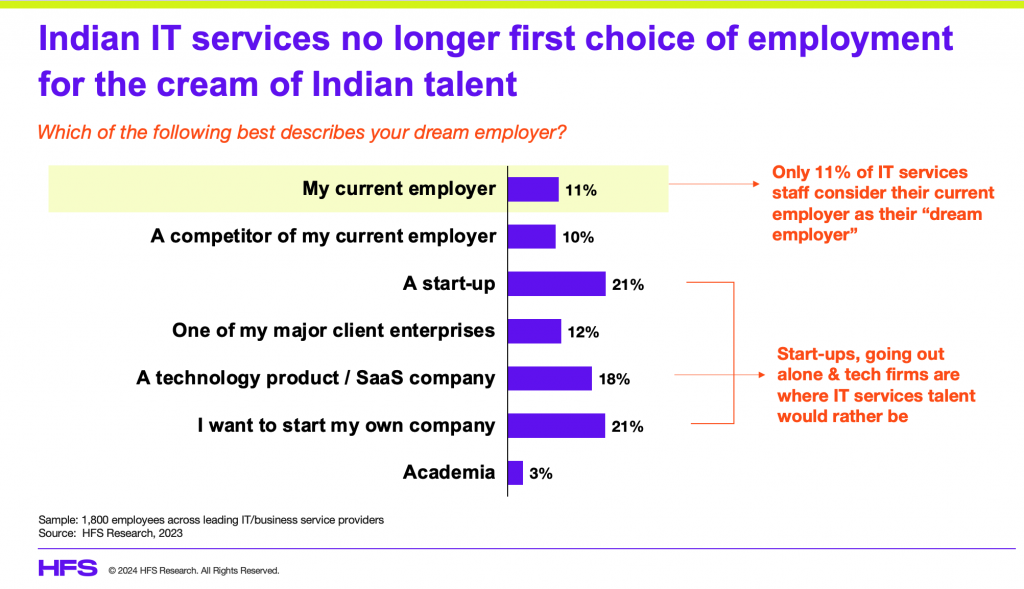
The noise surrounding GenAI has reached insufferable proportions – literally, everyone has to voice their opinion on it, regardless of who they work for or what their role is. Take a trip out to India, and similar rhetoric is yet again following these noises from America, jumping on the hype bandwagon as it did with internet enablement, digitization of business foundations, and, more recently, the directionless corporate lunge into the cloud.
Indian talent is steering clear of their IT services firms
The big dichotomy our India analyst team has pinpointed is the disconnect between the buzzing startup economy, which is sprouting literally hundreds of innovative firms such as DeltaCube, Xylem.ai, E42, Chaos Genius, A21.ai, Lami.fit, Perkant Tech, CoRover, Bhashini.ai, Machine Hack, Rephase.ai, Mockey, etc., while the lethargic IT services firms just can’t seem to break out of their paralyzed mindset. Plus, why have Microsoft, Google, et al., been hiring the cream of young Indian talent aggressively while the IT services shops obsess about forcing their staff back into the office, attempting to relive their glory years pre-Covid?
Our study of 1800 service provider staff tells us that the days of becoming a programmer to buy your first car are pretty much over… smart young talent today wants to make impact in their careers:
What happened to the entrepreneurial spirit and determination to win the hearts of their clients that drove incredible growth over the last couple of decades? Have they really become bloated, tired old shops that simply want to keep selling rollouts of “the next tech product”?
For 25 years, Indian IT services have profited from each of these technological shifts as enterprises groped for bread-and-butter IT support to fix bad code, test portfolios of legacy apps, maintain creaking infrastructures, and generally keep the IT wheels on global 2000 corporations hell-bent on sustaining archaic business operating models that have barely changed since World War II. In fact, at HFS we estimate that India now employs close to 7 million people in service providers and global capability centers (GCCs) to service these corporations with IT and business process support.
In den-ail? India’s IT services economy has a great opportunity with GenAI but will blow it if they cannot change their stuffy ways of operating
EY’s latest white paper, “The AIdea of India“, declared that Generative AI can add a cumulative $1.2 – $1.5 trillion to India’s GDP by 2030. So surely this means India’s leading service providers and GCCs are paving the way in rethinking how they train their people, how they recruit from Indian universities, and how they price their capabilities and services with their enterprise clients to infuse GenAI into the core of everything they do? The answer, sadly, is NO, as several leaders pointed out in public and private settings.
Having just spent a lovely week in India leading an HFS special event in Mumbai, followed by speaking at the Nasscom Technology Leadership Forum, I was overwhelmed with concern that so many leaders in India’s services industry really have no concept of what is going to hit them. Some Indian leaders declare GenAI as a massive game changer, while others just write it off as another tech tool they will learn to manage in the future. Whether or not they see the GenAI impact coming, the sad reality is that very few have a plan to change how they operate to exploit this impeding tremendous growth the likes of EY are proclaiming.
We have arrived in a dangerous period where many enterprise customer leaders are reaching the full realization that they need partners who understand their institutional issues and are willing to invest time to figure out a GenAI roadmap that will sharpen their competitive edge. The big challenge with GenAI is to clean up enterprises’ messy data so they can benefit from the tools. Otherwise, GenAI becomes lipstick looking for a pig. Enterprise leaders want no-nonsense partners who can understand the business context behind their data needs. Those partners who fail to step up will be quickly cast aside or relegated to low-value service contracts, which will continue to decline in value.
Indian support services could lose a million positions over the next couple of years as LLMs rapidly change how routine IT testing and coding work are delivered
“When will business pick up, Phil?” was the common question I was asked last week as if their global enterprise customers will suddenly magically find thousands of new IT roles to displace to Indian IT service partners. There just seems to be an expectation that the old model of swapping out people will continue along its previous linear growth trajectory as US and European enterprises maintain their insatiable need to keep spending more and more money on Indian-based services. It’s frightening to think how much the Indian services industry is likely to be impacted as the country comes to terms with the fact that the economic fundamentals of how IT services are delivered are changing forever.
For example, one enterprise has just concluded it can remove 15% of its IT staff from application testing by running an LLM against its testing processes. And this is just the start. When you consider that 20-30% of revenues for Indian-heritage IT services providers involve testing and quality assurance, it’s clear that there is growing pressure to weave GenAI into bread-and-butter IT areas like testing, routine maintenance and development. It doesn’t take a rocket scientist to conclude that a million of the 7 million Indian employees supporting routine-based testing and coding work could be eliminated in the next couple of years. There will also be similar ramifications felt in the Philippines and LLMs cut deep into customer support operations and other global regions such as Eastern Europe, which profit so well from technical engineering and coding services that are being impacted in a similar vein by GenAI.
And if Jensen Huang, CEO of NVidia, is to be wholly believed, our need for programmers is going to be completely eradicated in the future, and we should address what our kids study in college as a consequence:
Bottom-line: Many enterprise clients are crying out for help, but their partners are struggling to win their hearts. It’s now time for India’s leaders to rethink how their firms operate and address GenAI
The winners will be the partners who can quickly understand what needs to be done to fix and scale the data without charging the earth, with the ability to work fast and smart. When you look at the deep institutional relationships the likes of Cognizant, HCL, Infosys, TCS et al. have with their clients, many of whom are into 4th or even 5th-generation contracts, surely these firms have a tremendous opportunity to convince enterprise leaders to take a risk with them to make the painful changes necessary to capitalize on GenAI tech? Isn’t this a wonderful opportunity to upsell them new work, new ideas, and new ways to excite their staff? When the trust is already there, what is stopping IT and business services from moving up the value chain and helping enterprise customers desperately need more support from smart talent who understands their challenges?
India’s leaders must stop viewing GenAI as merely the next shiny tech tool, as opposed to what it really is – a truly disruptive technological evolution that will fundamentally change business models and radically change how we invest in technology solutions and services. All they need to do is look at the flourishing ecosystem of startups covering all angles of AI and industry solutions and embrace some of the entrepreneurial culture that once made them successful.
Quite simply, the conversation regarding what constitutes value needs to change – enterprises need to be convinced to pay for value than mere effort… is it really that hard? It seems to me that many service providers lack the leadership talent to have that conversation… and need to address that ASAP.
Posted in : Artificial Intelligence, Business Data Services, Business Process Outsourcing (BPO), Buyers' Sourcing Best Practices, Captives and Shared Services Strategies, Economics and Geopolitics, GenAI, Generative Enterprise, IT Outsourcing / IT Services







